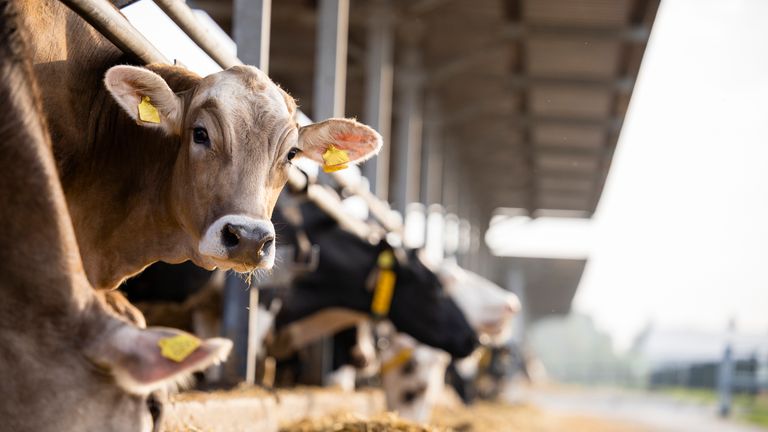A Defra spokesperson says the risk level in Britain has not changed but that they are watching the situation in America closely.
Thomas Moore
Science correspondent
@SkyNewsThomas
Thurday 25 April 2024

Thurday 25 April 2024

Cows in the UK are not being tested for bird flu, despite the outbreak sweeping through American dairy herds, Sky News has been told.
The Department for Environment, Food and Rural Affairs (Defra) said reports of the H5N1 virus in UK birds and poultry are currently so low that it does not consider cattle to be at risk.
Scientists believe the H5N1 virus has been spreading in US dairy herds undetected for several months.
It is also spreading between cows, and viral fragments have been found in pasteurised milk, according to the US Department of Agriculture.
Transmission between mammals is a red flag for scientists monitoring viruses that could cause the next pandemic.
A spokesperson for Defra said it was closely monitoring the US situation and collaborating with international partners to understand the origins and spread of the outbreak.
"The risk level in the UK has not changed," they said.
So far, 33 herds in eight states have been confirmed to be affected by the virus, but scientists believe it has spread far more widely since the first reports of a mysterious infection in dairy cows in Texas in February.
A farm worker has also tested positive, though they only developed an eye infection.
Advertisement
Dr Mandy Cohen, director of the Centers for Disease Control and Prevention, said: "The fact that it is in cattle now definitely raises our concern level.
"It's not a new strain of the virus. This is known to us. We've been studying it and been preparing for avian flu for 20 years."
Scientists are unclear on how the virus is spreading - or why only dairy herds, not beef cattle, have been affected.
It could be that they have been fed infected poultry carcasses that have been ground up in their feed.
Or that infected wild birds have gained access to the vast and crowded sheds in which many US dairy herds are kept.
Movement of cattle, equipment or people could also be helping the virus to spread.
The US Department of Agriculture has issued new rules in an attempt to contain the virus.
Lactating cattle must now test negative before being moved to a new state.
Although H5N1 has undergone mutations to survive in cattle cells, scientists say it is still a virus more suited to birds.
The risk to people is still considered to be low.
No comments:
Post a Comment